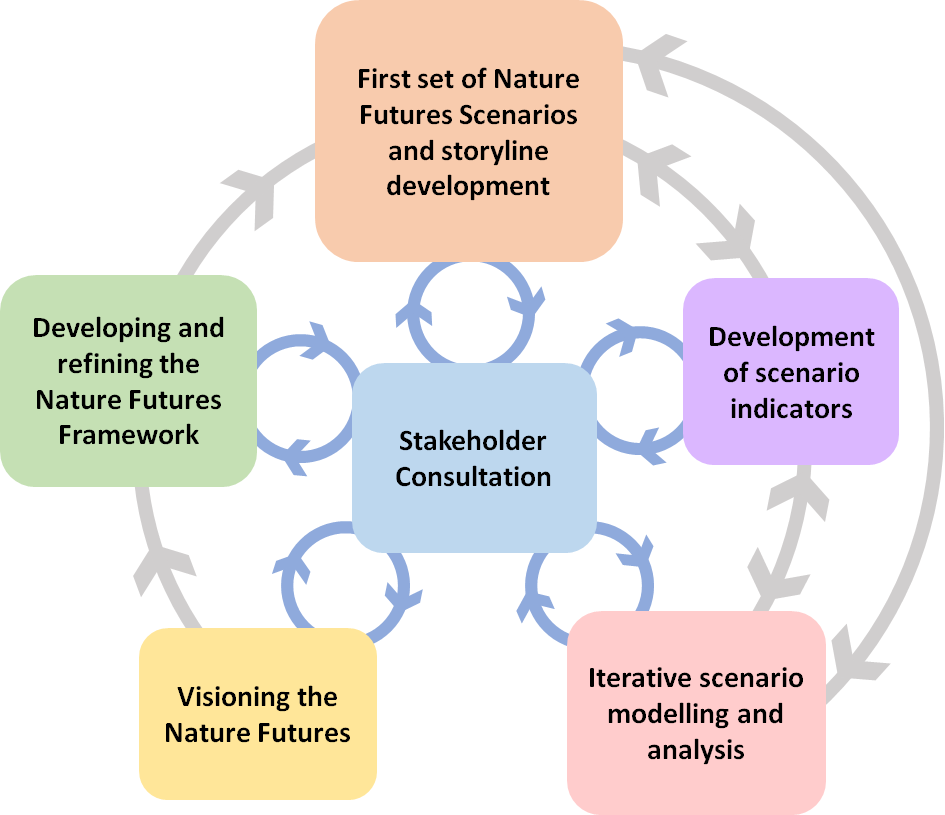Work of the IPBES technical support unit on scenarios and models
PBL hosts the IPBES Technical Support Unit (TSU) for scenarios and models. IPBES stands for the Intergovernmental Science-Policy Platform on Biodiversity and Ecosystem Services. The TSU supports the IPBES task force on scenarios and models, whose main tasks are explained in the next paragraph.
Main Role
The main role of the TSU is to support and facilitate the work of the task force and its members, logistically, but also for instance by mobilising stakeholders and academic networks for online and offline consultations and workshops. The TSU also adds scientific input as needed for the progress of the work, and is responsible for ensuring that the implementation of the work is inclusive and transparent, and in line with the IPBES rules and procedures.
Work of the IPBES task force on scenarios and models
The work of the IPBES Scenarios and Models expert group (2016-2019) and task force (2019 - present) builds on the IPBES Methodological assessment on scenarios and models (IPBES, 2016) and continues advanced work on scenarios and models of biodiversity and ecosystem functions and services. The aim is that such policy support tools will help guide decision-making, by taking into account the multiple values of nature and its contributions to people. The two main deliverables are:
- Providing expert advice to relevant expert groups of the Platform, in particular those undertaking assessments, on the use of existing scenarios and models to address current IPBES needs, and
- Catalysing the further development of scenarios and models by the broader scientific community for future IPBES assessments.
Multi-scale Scenario development
An important step for IPBES is to catalyse the development of nature-centred multi-scale scenarios for a sustainable future and to facilitate cross-scale and cross-sectoral coordination to assess and reverse declines in biodiversity and ecosystem services (BES). Existing scenario approaches have limitations and gaps that constrain their usefulness for BES, particularly with limited ability to incorporate policy objectives related to nature conservation and human well-being. To address these issues, the IPBES Scenarios and Models Expert Group initiated the development of a set of multiscale scenarios for Nature Futures based on positive visions for human relationships with nature.
The development of positive scenarios on the future of nature and nature’s contributions to people comprises an iterative process shown in Figure 1, including iterative stakeholder consultations throughout the process.

Initial work progressed by the expert group covered:
- The formulation of positive future visions for nature (report of the stakeholder workshop held in Auckland)
- The development of the Nature Future Framework to facilitate the development of new global BES scenarios (still in development) and progress on the modelling of BES scenarios using existing scenario frameworks.
Current work focusses on: - The development of the first suite of Nature Future Scenarios and associated narraves or ‘storylines’ that describe “what the world looks like” in each Nature Future Scenario;
- Further development of indicators required to address new BES variables within each scenario; and,
- Quantification of these storylines within iterative modelling and scenario analysis.
The Nature Futures Scenarios thus integrate both qualitative narratives and quantitative model output.
- LinkIPBES Homepage
- LinkIPBES page on scenarios and models
- LinkVisions for nature and nature’s contributions to people for the 21st century. Auckland, New Zealand
- LinkThe methodological assessment report on Scenarios and Models of Biodiversity and Ecosystem Services: Summary for Policymakers
- Publicatie | 19 November 2018Report on the Workshop ‘Next Steps in Developing Nature Futures’ (2018)
- Rapport | 30 September 2019Report on the workshop ‘Global Modelling of Biodiversity and Ecosystem Services’ (2019)
- Rapport | 31 July 2019Report on the workshop ‘From visions to scenarios for nature and nature’s contributions to people for the 21st century’(2019)
- Rapport | 2 July 2020Report on the workshop 'New Narratives for Nature: operationalizing the IPBES Nature Futures Scenarios'